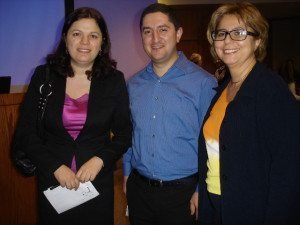NEWTON, Mass. (A.W.)—It was a lively evening on Wed., April 13, as the Armenian International Women’s Association (AIWA) teamed up with Boston College’s Center for Human Rights to stage a panel discussion on “Challenges in Women’s Health in Resource-Poor Countries: The Case of Armenia.” The panel consisted of Tigran Avetisyan, doctoral student at Boston University; Lusine Poghosyan, assistant professor at Northeastern University; and Mary Matosian, country director for the Tufenkian Foundation. The evening’s proceedings were ably moderated by Judy Norsigian, noted activist and executive director of “Our Bodies, Ourselves.”

As Norsigian noted in her introduction, the evening was devoted to exploring the realities of Armenian life for women today, as well as their hopes and plans for the future. The presentations were varied in approach, but all relevant to current affairs: Avetisyan’s paper was entitled “Maternity Care Challenges in Armenia and the Surrounding Region,” pointing to various developments, setbacks, and tendencies in public health since the fall of the Soviet Union. His was probably the least provocative of the three, choosing to focus on health care apart from its social and political implications.
Poghosyan’s paper was entitled “Gender Equality and Women’s Empowerment: Rural Women’s Rights for Reproductive Health,” using statistics to paint a rather bleak picture of conditions and constraints found in rural Armenia. She added that these conditions were not simply present, but often based on clear biases and discriminatory practices that pointed to larger social problems in dealing with women’s issues.
Matosian’s paper was entitled “Sexual Violence and Abuse in Armenia: Challenges and Solutions.” Like Poghosyan, Matosian outlined current conditions, but also pointed to various groups that have challenged the status quo, seeking to change public stereotypes, enact legislation, and provide care and hope for abused women. In particular, Matosian pointed to the emerging “Coalition Against Violence Against Women,” which has drawn numerous civil groups together to work on common issues, such as domestic violence and trafficking in women. Matosian also presented a brief documentary film depicting some of these stark realities.
The presentations were followed by a spirited question-and-answer session, moderated and guided by Norsigian. Overall, the event marked a small step forward in providing women’s issues their space in Armenian American public discourse. Unfortunately, the turnout at the event was subpar (under 50), leaving the organizers with much work to do in preparing their future events.
The event was organized in cooperation with the Boston College Armenian Students’ Association, whose representatives also attended.


Be the first to comment